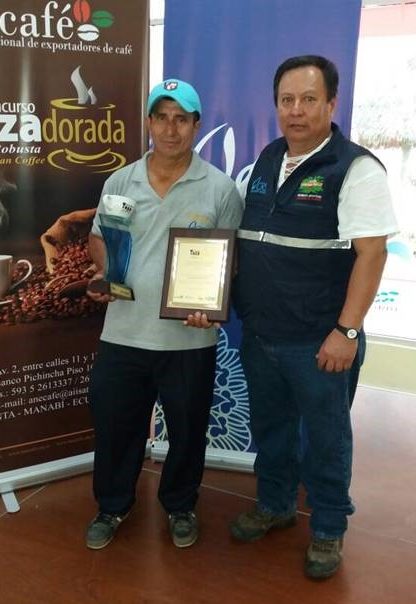The Coffeelands blogs suffers from a few coffee prejudices, which we readily admit to. Our geographical base is in Central America and therefore our coverage tends to be towards issues that are of great concern in this part of the world. We’re unabashedly Arabica centric as well. You’ll find it in our daily drink and much of CRS’s coffee funding has focused on this crop. But the times, as Dylan sings, “they are a changin’!” Over thirty five percent of the global coffee market is Robusta (estimates are near 60 million bags of the 145 – 150 million bags globally are Robusta) and the pressures created by the increasing global demand for coffee (especially from developing economies) combined with decreasing areas of suitable Arabica production areas due to climate change means that planting Robusta coffee is becoming an attractive, and even necessary, alternative. While Robusta was primarily a crop grown in southeast Asia and Africa, in the past five to 10 years, Robusta is increasingly found in the lowlands Latin America, in countries known for the quality of their Arabicas.
CRS’s first engagement with Robusta in Ecuador was through the Borderlands Project (funded by the Howard G. Buffett Foundation), which was implemented by Caritas Sucumbios and by CRS. The project’s name referred to interventions that took place on both sides of the Colombian-Ecuadoran border, with very different realities and very different types of coffee crops on each side. Borderlands in Ecuador focused on establishing plots and improving the management of Robusta varieties. When Borderlands ended, CRS started a new project phase, called the Coffee Table (financed by the Father’s Table Foundation), which is focusing more on improving post-harvest processes for Robusta – both for specialty and mass markets.
On August 17 and 18 of this year, ANECAFE – the Ecuadorian national association of coffee exporters- and the Provincial government of Sucumbios, held the 2nd annual “Taza Dorada” (Golden Cup) for Robusta coffee. We wrote about the first one here.
This year, 34 different lots entered the competition. National judges selected the best 25 to go to the final round. Each lot was a minimum of four sacks of coffee.
For the final round, there were five judges representing local and international markets who are familiar with grading Robustas: Miguel Meza, of Paradise Coffee Roasters; Dorothea Hescock, of Massimo Zanetti; Robin Stoll, from SUCAFINA; Mario Idrovo, an Ecuadoran national barista champion and Fernando Morocho, from Solubles Instataneos – a local instant coffee company.
Of the 25 lots in the final, 13, over half, came from participants of the “Coffee Table” project, including the winner and 3rd place finisher.
The winner was Ángel Cleotildo Varela Arteaga, from Cochas de Betano, with an 84.30. The winning lot had flavor characteristics of red and tropical fruits, brown sugar and cacao, with a high acidy and full body. This lot was sold for $3.00 a pound, which is triple the current London price (0.97/lb. as of 8/29).
Third place went to Mrs. Sofía Ruth Aguinda Andi, who is a member of the farmer organization Kallari Muskuy Warmi Wankurishka of Loreto. Sofia Aguinda is a Kichwa national of the Avila Huiruno community. Her lot scored an 84.00 and was characterized by fruity aroma, with notes of honey, chocolate, coconut and wood tones with a medium body.
We hope we can continue to replicate the experiences of Sofía and Ángel and help usher in a Robusta market that rewards quality. Fine Robusta can offer flavors not found in Arabica, providing another sensory variable for baristas and roasters to create unique espresso blends to delight their customers. These same Robustas can provide another option for the thousands of climate change refugee coffee farmers who in a few years’ time, will no longer be able to grow Arabica.



